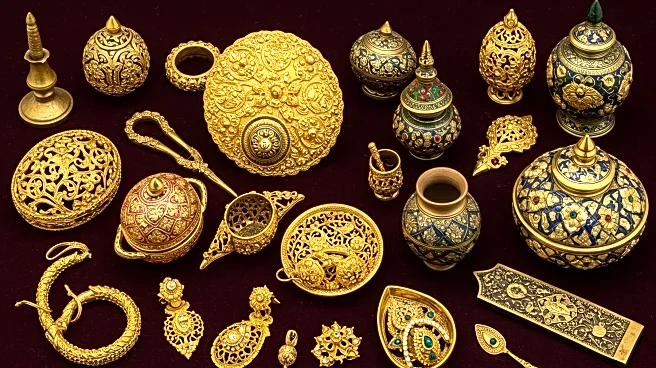What's Happening?
Archaeologist Piyawit Moonkham from Chiang Mai University has discovered evidence of betel nut use dating back 4,000 years at the Nong Ratchawat burial site in Thailand. Despite the absence of red stains typically associated with betel nut chewing, analysis of dental plaque from one individual revealed compounds found in betel nuts. This suggests alternative consumption methods or effective teeth cleaning practices. Betel nuts, known for their psychoactive effects, have been a cultural practice in Southeast Asia for thousands of years, influencing social customs and traditional medicine.
Why It's Important?
The discovery highlights the long-standing cultural significance of betel nut chewing in Southeast Asia, offering insights into ancient social practices and rituals. It underscores the complexity of archaeological research, where invisible evidence can reveal historical behaviors. Understanding the use of psychoactive substances in ancient societies can inform studies on cultural evolution and the development of social norms. The findings may also contribute to discussions on the health implications of betel nut use, which remains prevalent in some regions today.
What's Next?
Further research may focus on uncovering more evidence of betel nut use in ancient societies, exploring its social and cultural roles. Archaeologists might investigate other burial sites to determine the prevalence of betel nut consumption and its impact on social status. Studies could also examine the health effects of long-term betel nut use, providing historical context for modern health policies. The research may lead to broader investigations into the use of psychoactive substances in ancient cultures and their influence on societal development.
Beyond the Headlines
The discovery raises questions about the role of psychoactive substances in shaping cultural identities and social hierarchies. It challenges assumptions about gender roles in ancient societies, as the individual with evidence of betel nut use was female, contrary to previous trends. The findings may influence cultural heritage preservation efforts, highlighting the importance of understanding traditional practices. Additionally, the research could impact contemporary discussions on the regulation and cultural acceptance of psychoactive substances.









